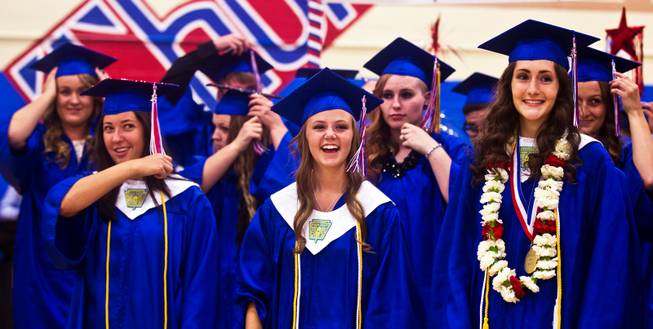
Seniors laugh at a classmate as their tassels are moved during graduation at Indian Springs High School on Thursday, June 4, 2015.
Published Tuesday, July 21, 2015 | 2:09 p.m.
Updated Tuesday, July 21, 2015 | 4:28 p.m.
CARSON CITY — Only 8 percent of Nevada's high school juniors are ready for college in four major subject areas, according to preliminary results from the ACT that was administered almost universally in the state for the first time this spring.
The Nevada State Board of Education is scheduled to talk this Thursday about the test results, which show Nevada students earned an average composite score of 17.4 on a 36-point scale. That's well below the average composite score of 20 among the twelve other states that tested 100 percent of their graduates in 2014.
"That's shocking ... and this is from someone who has spent years now diving into our educational system," said Democratic former Assemblywoman Lucy Flores, who sponsored the bill in 2013 that called for the test to be administered statewide. "It's a stark reminder that we've got a lot more work to do."
Preliminary data show 7,169 students in the graduating class of 2014 were tested, or about 23.1 percent of graduates, and 1,815 met college-readiness benchmarks in English, math, reading and science. That's about 25 percent of test-takers.
A state report prepared for the board shows 29,954 juniors took the test in 2015, and 2,443 met the benchmarks in all four subjects. That's about 8 percent of test-takers.
In all, 628 more test-takers were classified as college ready this time around compared with the class of 2014.
Students who earn a college-ready score, according to the ACT, have a 75 percent chance of getting a C or higher in a corresponding college course.
The state's average composite score, which was 21.2 in 2014, was expected to drop as the testing pool grew beyond the smaller group of students who previously would have paid their own way to take the test.
But proponents say offering the test more widely, and having the state and school districts cover the $1.9 million bill, gives students free access to scores that will come in handy in their next academic step.
"It provides each student the opportunity to have a college entrance exam that can count for college," said Victoria Carreon, education policy director for the Guinn Center for Policy Priorities. "This is a great benefit to our students, and it does give us a national benchmark. It does help us compare, and it helps us set goals for our students."
Nevada law requires high school juniors to take the test, but it doesn't allow the scores to decide whether a student will graduate. The same law does away with a high school proficiency exam students needed to pass to graduate, and makes way for high-stakes, subject-specific, end-of-course exams taken earlier in a student's high school career.
Flores said that she is disheartened by the first batch of ACT scores under the new policy, but she is encouraged that lawmakers voted this spring to invest more money in Nevada schools.
"I think we've made a whole lot of progress," Flores said about the increased funding. "I hope this serves as a very stark reminder that we have to keep our foot on the gas pedal. We have to make sure every last kid has the resources they need."

Join the Discussion:
Check this out for a full explanation of our conversion to the LiveFyre commenting system and instructions on how to sign up for an account.
Full comments policy